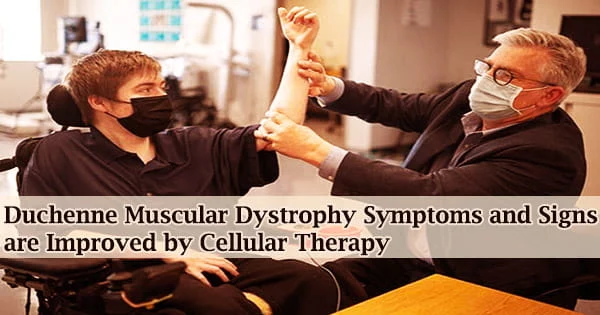A cellular therapy showed promise in a clinical trial at UC Davis Health and six other sites for patients with late-stage Duchenne muscular dystrophy (DMD), a rare genetic condition that causes muscle loss and physical disabilities in young people.
The treatment appears to be both safe and helpful in preventing upper limb and cardiac function decline. It is the first medication to result in meaningful functional gains in DMD individuals with the most severe instances.
“HOPE-2 is the first clinical trial to test systemic cell therapy in DMD,” said Craig McDonald, the trial’s national principal investigator and lead author on the study. McDonald is the professor and chair of physical medicine and rehabilitation and professor of pediatrics at UC Davis Health.
“The trial produced statistically significant and unprecedented stabilization of both skeletal muscle deterioration affecting the arms and heart deterioration of structure and function in non-ambulatory DMD patients.”
Findings from the trial were published today (March 10, 2022) in The Lancet.
Cellular therapy for muscular degeneration
The researchers employed Capricor Therapeutics’ CAP-1002 allogeneic cardiosphere-derived cells (CDCs) generated from human heart muscles in the Phase II clinical trial. These cells have the ability to alleviate muscular inflammation while also promoting cell regeneration.
“The primary mechanism of the CAP-1002 therapy is to help reduce the disease’s serious chronic inflammation problems, decrease fibrosis and improve muscle regeneration, and thereby maintain or improve critical heart and skeletal muscle function,” McDonald said.
We worked with the Alpha Stem Cell Clinic and benefitted from the stellar infrastructure of the UC Davis Department of Physical Medicine and Rehabilitation’s Neuromuscular Research Lab and the Clinical and Translational Science Center (CTSC). I think this is a great testimony to the UC Davis Health leadership in stem cell therapeutic trials and clinical translational medicine.
Craig McDonald
The study looked at the long-term efficacy and safety of intravenous CAP-1002 infusions for the treatment of late-stage DMD. Twenty patients with DMD were enrolled in the study, which took place in seven different locations across the United States.
The subjects were at least ten years old and had moderate arm and hand weakness. They were given either CAP-1002 or a placebo infusion every three months for a year, for a total of four infusions.
Significant improvements in arm, hand, and heart functions
Upper limb function was examined using the Performance of Upper Limb (PUL) motor function scale for DMD, heart function was assessed using cardiac magnetic resonance imaging (MRI), a respiratory function was measured using spirometry, and circulating biomarkers were measured.
The PUL of the participants was examined at the time of their initial infusion and again after a year. The difference in mid-level/elbow PUL scores between these two values was measured.
Participants who received CAP-1002 had a much better outcome than those who received the placebo, according to the study. The cell-treated group showed considerably less impairment in upper extremity muscular function.
The cardiac MRI also revealed that subjects who received CAP-1002 had improved heart shape and function.
“Here we show the promise of cell therapy in preventing the progression of heart disease in a rare genetic disease, but there is good reason to believe that such therapy may one day also be used for more common forms of heart failure,” said co-author Eduardo Marbán, a pioneering heart researcher who first discovered that CDCs might be useful in treating DMD.
He is the executive director of the Smidt Heart Institute at Cedars-Sinai Medical Center in Los Angeles and the Mark Siegel Family Foundation Distinguished Professor.
Moving forward
HOPE-3 is a Phase III clinical trial that McDonald and collaborators in other US centers are launching. The purpose of this study is to confirm CAP-1002’s efficacy in a broader group of patients.
“The FDA has signaled that a larger Phase III study would be the next step toward gaining drug approval. We need to confirm therapeutic durability and safety of CAP-1002 beyond 12 months for the treatment of muscular degeneration in the heart and skeleton,” McDonald said.
What is Duchenne muscular dystrophy
DMD is a condition that affects roughly one out of every 5,000 boys. It commonly manifests as in early childhood, producing gradual weakening and persistent inflammation of the skeletal, cardiac, and respiratory muscles, as well as delays in developmental milestones like sitting and walking. Patients with DMD often lose their ability to walk in their teenage years, and as they become older, they suffer heart and lung issues.
There are few treatments for DMD, and there is no cure. Current skeletal muscle-targeting treatments are ineffective in treating DMD-affected cardiac muscle.
A medication that stabilizes or reverses heart deterioration while increasing upper limb function would be one of a kind in terms of its capacity to address the massive disease load found in advanced DMD patients.
“This cell-based therapy is innovative in that it addresses the critical needs of patients with the most severe disease burden and stabilizes both upper limb and heart function. Therapies that address the later stages of the disease can make a tremendous impact on the quality of life for boys and young men with DMD and lessen the burden of care for their families,” McDonald said.
Collaborations that made HOPE possible
The team worked with academics and personnel at the California Institute for Regenerative Medicine (CIRM)-funded UC Davis Alpha Stem Cell Clinic. The HOPE-2 experiment was the clinic’s first attempt at cellular therapy.
“We worked with the Alpha Stem Cell Clinic and benefitted from the stellar infrastructure of the UC Davis Department of Physical Medicine and Rehabilitation’s Neuromuscular Research Lab and the Clinical and Translational Science Center (CTSC). I think this is a great testimony to the UC Davis Health leadership in stem cell therapeutic trials and clinical translational medicine,” McDonald said.
The scientists also obtained cardiac MRI data on trial participants from the UC Davis Imaging Research Center. Capricor Therapeutics sponsored the trial (NCT03406780).





